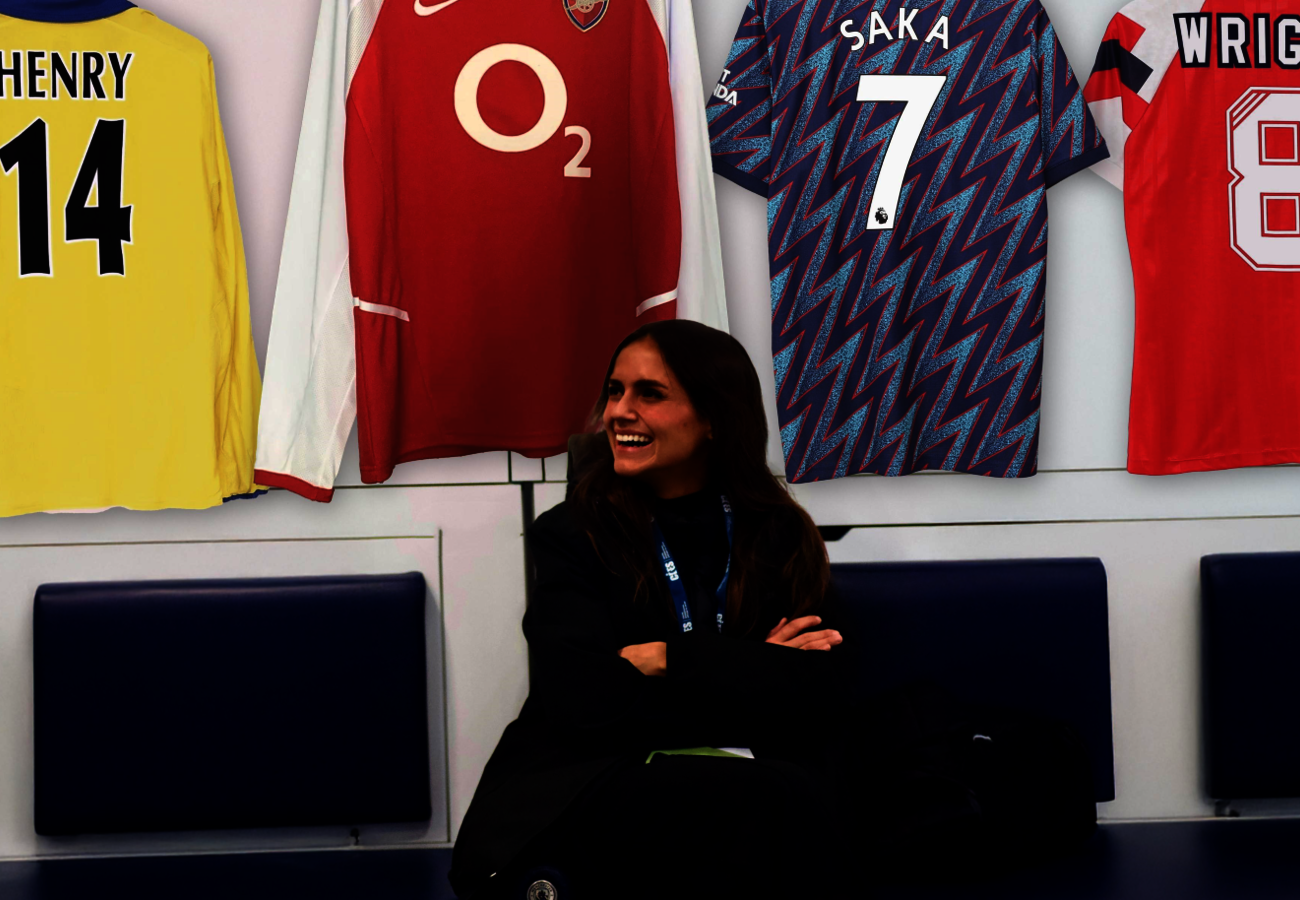SPORTING HER ROOTS: Daniela Huamán
(FIFA Master 25th edition)

Growing up in Peru, Dani Huamán’s worldview was shaped early by a deep sensitivity to inequity. “I’ve always been very conscious of injustice,” she says, adding, “I’ve always felt the world really intensely, which when you grow up fairly privileged in a developing country creates a heavy kind of awareness.” Her parents, shaped by their own experiences during Peru’s civil unrest, made a point of helping Dani understand the country in both its beauty and its hardship. “My parents made a very conscious effort to help me see the realities of the country,” she explains, “one that has been shaped by a lot that is very painful and very recent.” Layered with nuanced family discussions and exposure to stark societal contrasts, these early experiences planted in Dani a lifelong desire to challenge inequality and seek her purpose through action. “Being exposed to such visible disparities leaves a sense of guilt,” Dani says about her upbringing, “but also a strong sense of responsibility.”
Sport has served multiple roles throughout Dani’s life, becoming whatever she needed at the time, be that a language of belonging, a form of protection, or a lifeline. “As an only child, sport has always been a way for me to make friends and build a community around me,” she says. This mindset introduced her to her first love of basketball, which she says, “defined the course of [her] life.” It would eventually lead to a career in marketing, sparked by a conversation with a university friend who also played, and to meeting her now-husband on a recreational adult basketball team. “I feel like all of the important relationships and important moves in my life have kind of happened because I was involved in basketball from an early age.” As Dani’s world expanded beyond Peru, sport remained the constant in unfamiliar places.
Such was the case at the age of 15, when her parents announced a move to Spain for her mother’s job. “I grew up in an environment where education was about more than academics, it was about being aware of issues and being unafraid to question or challenge ideas.” So, after going away to collect herself upon receipt of this life-changing news, Dani returned with a piece of paper and a pen to formulate her contract. Her terms included the ability to visit her grandparents at least once a year and returning for her school trip. Though Dani describes the move to Spain as “terrifying,” sport once again became her entry point. “Everyone had learned I was quite sporty, so one day they had me race the most athletic girl in school. I wasn’t in trainers, so I took my shoes off and raced in a skirt and socks…and came away with the win,” Dani recalls. “Initially, she was livid. And then afterwards I think she appreciated having someone at school who shared her passion for sport. So again, it was a way to relate to people.”
While sports helped her integrate socially, she never let go of her Peruvian roots. Even without a language barrier, adapting to Spanish culture came with its own learning curve. “I realized that trying to blend in was not only using a lot of mental energy but also doing a complete disservice to who I am,” she reflects. “It was a difficult time because you’re at the age when you’re trying to figure out who you are – and then on top of that you’re in this completely new environment. But I think once you’ve moved countries once, you are never scared of doing it again.”
This confidence brought Dani to the University of Bath in England, where she pursued economics and international development. “In the first year of university, I was again a fish out of water,” she remembers. “I studied in English schools all my life, but when you’re suddenly surrounded by different accents, customs, and ways of doing things, it can get overwhelming.” Still, she credits her time in the UK as pivotal. “England was where I became an adult in a lot of ways.” Through both coursework and a year working in development consulting, Dani began to see the complexity of making systemic change.“I think only a couple of us stayed in international development. Others looked towards different sectors, where the path to impact perhaps felt a little more direct,” she says of her and her classmates. “But at the time, it felt like losing my north star.”
After graduating, Dani set out to rediscover her sense of purpose. That search led her to business school and eventually to a graduate scheme at Burberry. “Going from international development to designer fashion, you’d argue that my social conscience had swung hard the other side,” she jokes. The leap may have seemed unlikely, but it became a turning point. A chance conversation with a university friend opened the door to marketing, a field where Dani would spend the next 10 years building a career.
During that time, running emerged as a quiet constant – first as a way to stay active during the COVID-19 lockdowns and eventually as something much more. “I think some people meditate by sitting still,” she says. “For me, I clear my head when I’m moving.” Dani found herself running longer distances, eventually completing the London Marathon, an experience she found to be both physically and mentally transformative. “Running became this unexpected outlet – a way to reconnect with myself. The London Marathon is probably one of the toughest and also the most amazing things I've ever done. It taught me that you can only control the controllables and to be proud of the effort no matter the outcome.”
A decade in marketing in the technology industry brought Dani professional success, but it also left her questioning whether being good at something meant it was truly meant for her. “The 10 years I was in marketing, I achieved so much professionally, I found lifelong friends and mentors, but I felt like I was missing a sense of purpose. By all standards, I had ‘made it,’ but it didn’t feel right.” So, Dani began to plot a trajectory that merged her lifelong passions: sport, justice, and impact.
A career coaching course helped Dani partake in both intentional unlearning and deep reflection, allowing her to reconnect with the core of what drives her. “I realized you can create real social impact through sport and that actually sport is this powerful force that knows no borders or languages,” she says. Despite this realization, Dani still felt some understandable apprehension. “This wasn’t an obvious career choice for me. I’m 34 years old and knee deep in a career that I’ve worked really hard to build. So, what now?”
Still, Dani continued to reshape her career, not abandoning her past but reframing it through the lens of sport and equity. This process led her to discover the FIFA Master, the perfect environment to let her explore and refine her next chapter. As momentum around diversity, equity, and inclusion in sport continues to grow, she wants to play a part in building systems that are reflective of the communities they serve. Gender is one part of that. “Sports are still generally governed by and designed for a specific type of person,” she says. “Of course, we’ve made big strides in the industry, but there’s still little recognition that women have different needs to men. Even though women’s sports are growing, many systems and regulations still don’t account for that. One day soon, I want little Dani in Peru to not have to fight for a football coach.”
Though her path has spanned continents and careers, Dani’s journey continues to be anchored in where she came from…and who she’s choosing to become. “Even though I resisted it and didn’t understand it at the time, I think my parents’ decision to move was probably the best thing that could have happened to us.” That move, and everything it set in motion, helped shape the sense of purpose she holds today. “Staying connected to your roots doesn’t hold you back,” she says. “If anything, they give you a reason to build something better.”
By Geneva Decker
FIFA Master 25th edition student
FIFA Master - International Master in Management, Law and Humanities of Sport, ranked Europe's No.1 course a record 12 times by SportBusiness.
FIFA Master - 25 years of Excellence in Sport Business Education - organised by CIES in partnership with De Montfort University (UK), SDA Bocconi School of Management (Italy) and the University of Neuchâtel (Switzerland).









